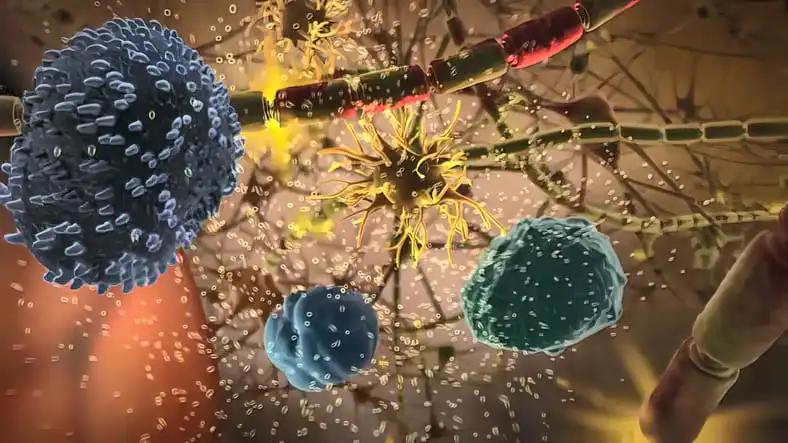KEY TAKEAWAYS
- The phase1/2 clinical study of AUTO4, a CAR T cell treatment targeting TRBC1, has shown promising results for pts with TRBC1-positive PTCL.
- Primary endpoints were toxicity and dose-limiting toxicity frequency within specific time frames after AUTO4 infusion. Response rate was the secondary endpoint.
- The 12 and 15-month CMR results have demonstrated great potential.
The clinical trial for AUTO4, a chimeric antigen receptor (CAR) T-cell therapy that targets T cell receptor beta-chain constant 1 (TRBC1) for patients with TRBC1-positive PTCL, has shown promising results. Patients (pts) with Relapsed/refractory (r/r) peripheral T cell lymphomas (PTCL) have extremely aggressive tumors, resulting in a very poor prognosis. Still, this new targeting strategy based on the mutually exclusive expression of TRBC1 and TRBC2 (Maciocia, PM. et al. Nat Med, 2017) can spare a portion of the standard T cell compartment.
The ongoing, multi-centre, single-arm phase 1/2 study examines the impact of various dosage levels of AUTO4 on r/r TRBC1-positive PTCL. The study administered a single dosage of either 25 × 106, 75 × 106, 225 × 106, or 450 × 106 CAR T cells. CAR T-cell products were produced using a semi-automated closed process. Process A determined the recommended phase 2 dose, while process B defined it. The primary endpoints for Phase 1 included the incidence of ≥Grade 3 toxicity within 60 days of AUTO4 infusion and the frequency of dose-limiting toxicities (DLT) within 28 days of AUTO4 infusion. The secondary endpoint was the overall response (CR + PR) rate determined by Lugano PET-CT criteria.
As of February 8th, 2023, AUTO4 treatment had been administered to 12 pts (10 process A, two process B). The age range of those treated was 34 to 72, with a median age of 57. Seven patients were diagnosed with PTCL-NOS, 4 with AITL (Angioimmunoblastic T-cell lymphoma), and 1 with ALCL (Anaplastic large cell lymphoma). Most pts (70%) received chemotherapy bridging, and 4 out of 8 CD30+ patients received brentuximab as bridging or prior line therapy. Three of the 12 pts had undergone prior autoSCT. While transient Grade 1-4 neutropenia and thrombocytopenia were among the most common treatment adverse events, lymphopenia was observed with CD3+ lymphocytes recovering to baseline levels after pre-conditioning, and no infections were observed that were ≥Grade 3. Of 12 patients, six experienced CRS of any grade (5 at 450 × 106, 1 at 250 × 106), with one patient having Grade 3 CRS, which resolved within three days. Additionally, no ICANS or DLTs were detected. The response was evaluated using Process A at month one, wherein 9 out of 10 patients were assessed.
From these evaluations, five patients achieved complete metabolic response (CMR), with one patient already having CMR at lymphodepletion. One patient obtained a partial response (PR), and three showed no reaction. At the 450×106 dose level, 3 out of 4 patients achieved CMR at month one, with two patients experiencing remission at 12 and 15 months, respectively. The efficacy non-evaluable patient, who had a COVID-19 infection, showed no response at month three but obtained a delayed PR by month nine without further treatment.
AUTO4 showed good tolerance without DLT. The 12 and 15-month CMR results have demonstrated great potential. Updated data with longer follow up will be shared utilizing the improved manufacturing process B.
Source: https://onlinelibrary.wiley.com/doi/10.1002/hon.3163_44
Clinical Trial: https://classic.clinicaltrials.gov/ct2/show/NCT03590574
Cwynarski, K., Iacoboni, G., Tholouili, E., Menne, T., Irvine, D., Balasubramaniam, N., Wood, L., Stephens, C., Shang, J., Xue, E., Zhang, M., Basilico, S., Raymond, M., Lao-Sirieix, P., Lilova, K., Brugger, W., & Pule, M. FIRST IN HUMAN STUDY OF AUTO4, A TRBC1-TRAGETTING CART T CELL THERAPY IN RELAPSED/REFRACTORY TRBC1-POSITIVE PERIPHERAL T-CELL LYMPHOMA. Hematological Oncology, 41, 80-81. https://doi.org/10.1002/hon.3163_44



